FAMILY ITS
Page 52
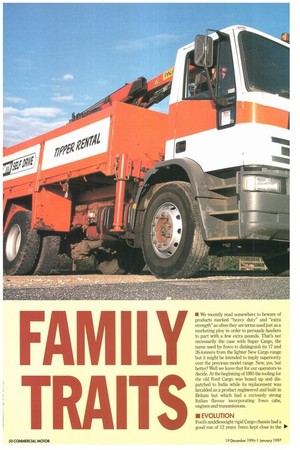
Page 54
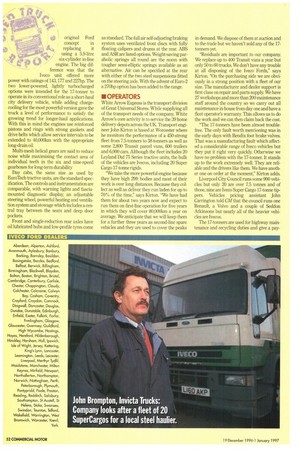
Page 55
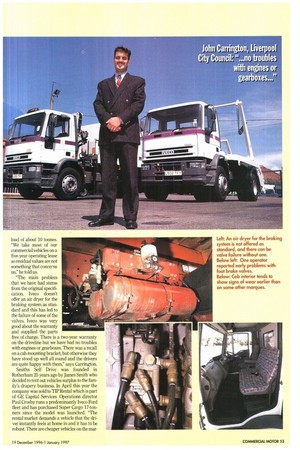
Page 56
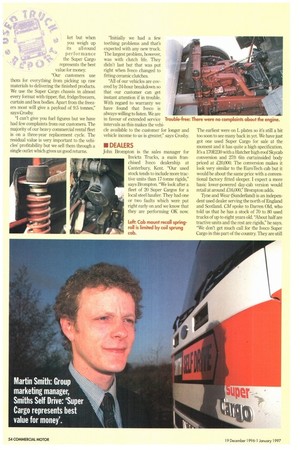
Page 57
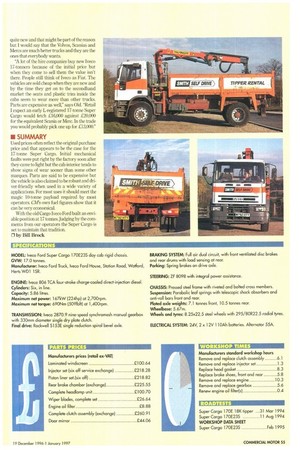
If you've noticed an error in this article please click here to report it so we can fix it.
• We recently read somewhere to beware of products marked "heavy duty" and "extra strength" as often they are terms used just as a marketing ploy in order to persuade hauliers to part with a few extra pounds. That's not necessarily the case with Super Cargo, the name used by Iveco to distinguish its 17 and 26-tonners from the lighter New Cargo range but it might be intended to imply superiority over the previous model range. New, yes, but better? Well we leave that for our operators to decide. At the beginning of 1993 the tooling for the old Ford Cargo was boxed up and dispatched to India while its replacement was heralded as a product engineered and built in Britain but which had a curiously strong Italian flavour incorporating Iveco cabs, engines and transmissions.
• EVOLUTION
Ford's middleweight rigid Cargo chassis had a good run of 12 years. Iveco kept close to the 110. original Ford concept in replacing it
using a 5.9-litre six-cylinder in-line engine. The big difference was that the Iveco unit offered more power with ratings of 143,177 and 227hp. The two lower-powered, lightly turbocharged options were intended for the 17-tonner to operate in its conventional role as a short-haul city delivery vehicle, while adding chargecooling for the most powerful version gave the truck a level of performance to satisfy the growing trend for longer-haul applications. With this in mind the engines use reinforced pistons and rings with strong gaskets and drive belts which allow service intervals to be extended to 40,000km with the appropriate long-drain oil.
Multi-mesh helical gears are said to reduce noise while maximising the contact area of individual teeth in the six and nine-speed gearboxes for long-term durability Day cabs, the same size as used by EuroTech tractive units, are the standard specification. The controls and instrumentation are comparable, with warning lights and fasciamounted diagnostic display, an adjustable steering wheel, powerful heating and ventilation system and stowage which includes a central tray between the seats and deep door pockets.
Front and single-reduction rear axles have oil lubricated hubs and low-profile tyres come
as standard. The full air self-adjusting braking system uses ventilated front discs with fully floating calipers and drums at the rear. ABS and ASR are listed options. Weight-saving parabolic springs all round are the norm with tougher semi-elliptic springs available as an alternative. Air can be specified at the rear with either of the two steel suspensions fitted on the steering axle. With the advent of Euro-2 a 270hp option has been added to the range.
• OPERATORS
White Arrow Express is the transport division of Great Universal Stores. While supplying all of the transport needs of the company, White Arrow's core activity is to service the 39 home delivery depots across the UK. Transport engineer John Kirton is based at Worcester where he monitors the performance of a 450-strong fleet from 7.5-tonners to 38-tonners as well as some 2,800 Transit parcel vans, 600 trailers and 6,000 cars. Although the fleet includes 20 Leyland Daf 75 Series tractive units, the bulk of the vehicles are Ivecos, including 20 Super Cargo 17-tonne rigids.
"We take the more powerful engine because they have high 29ft bodies and most of their work is over long distances. Because they collect as well as deliver they run laden for up to 70% of the time," says Kirton. "We have had them for about two years now and expect to run them on first-line operation for five years in which they will cover 80,000km a year on average. We anticipate that we will keep them for a further three years as second-line spare vehicles and they are used to cover the peaks
in demand. We dispose of them at auction and to the trade but we haven't sold any of the 17tonners yet.
"Residuals are important to our company. We replace up to 400 Transit vans a year but only 50 to 60 trucks. We don't have any trouble at all disposing of the Iveco Fords," says Kirton. "On the purchasing side we are obviously in a strong position with a fleet of our size. The manufacturer and dealer support is first class on repair and parts supply. We have 27 workshops and more than 200 maintenance staff around the country so we carry out all maintenance in-house from day one and have a fleet operator's warranty This allows us to do the work and we can then claim back the cost.
"The 17-tonners have been almost troublefree. The only fault worth mentioning was in the early days with Bendix foot brake valves. That was a manufacturing fault which affected a considerable range of Iveco vehicles but they put it right very quickly. Otherwise we have no problem with the 17-tonner. It stands up to the work extremely well. They are reliable and the drivers like them. We have another one on order at the moment," Kirton adds.
Liverpool City Council runs some 900 vehicles but only 20 are over 7.5 tonnes and of those, nine are Iveco Super Cargo 17-tonne tippers. Vehicles pricing assistant John Carrington told CM that the council runs one Renault, a Volvo and a couple of Seddon Atkinsons but nearly all of the heavier vehicles are Ivecos.
The 17-tonners are used for highway maintenance and recycling duties and give a pay load of about 10 tonnes. We take most of our commercial vehicles on a five-year operating lease so residual values are not something that concerns us," he told us.
"The main problem that we have had sterns from the original specification. Iveco doesn't offer an air dryer for the braking system as standard and this has led to the failure of some of the valves. Iveco was very good about the warranty and supplied the parts free of charge. There is a two-year warranty on the driveline but we have had no troubles with engines or gearboxes. There was a recall on a cab mounting bracket, but otherwise they have stood up well all round and the drivers are quite happy with them," says Carrington.
Smiths Self Drive was founded in Rotherham 25 years ago by James Smith who decided to rent out vehicles surplus to the farnily's drapery business. In April this year the company was sold to TIP Rental which is part of GE Capital Services. Operations director Paul Crosby runs a predominantly Iveco Ford fleet and has purchased Super Cargo 17-tonners since the model was launched. "The rental market demands a vehicle that the driver instantly feels at home in and it has to be robust. There are cheaper vehicles on the mar
ket but when you weigh up its all-round
tib performance
0 the Super Cargo represents the best
A value for money. Our customers use them for everything from picking up raw materials to delivering the finished products. We use the Super Cargo chassis in almost every format with tipper, flat, fridge/freezers, curtain and box bodies. Apart from the freezers most will give a payload of 9.5 tonnes," says Crosby.
"I can't give you fuel figures but we have had few complaints from our customers. The majority of our heavy commercial rental fleet is on a three-year replacement cycle. The residual value is very important to the vehicles' profitability but we sell them through a single outlet which gives us good returns. "Initially we had a few teething problems and that's expected with any new truck. The largest problem, however, was with clutch life. They didn't last but that was put right when Iveco changed to fitting ceramic clutches.
"All of our vehicles are covered by 24-hour breakdown so that our customer can get instant attention if in trouble. With regard to warranty we have found that Iveco is always willing to listen. We are in favour of extended service intervals as this makes the vehi cle available to the customer for longer and vehicle income to us is greater," says Crosby.
• DEALERS
John Brompton is the sales manager for Invicth Trucks, a main franchised Iveco dealership at Canterbury, Kent. "Our used stock tends to include more tractive units than 17-tonne rigids," says Brompton. "We look after a fleet of 20 Super Cargos for a local steel haulier. They had one or two faults which were put right early on and we know that they are performing OK now. The earliest were on L plates so it's still a bit too soon to see many back in yet. We have just got one used Super Cargo for sale at the moment and it has quite a high specification. Its a 170E230 with a Hatcher high-roof Skycab conversion and 27ft 6in curtainsided body priced at £20,000. The conversion makes it look very similar to the EuroTech cab but it would be about the same price with a conventional factory fitted sleeper. I expect a more basic lower-powered day-cab version would retail at around £16,000," Brompton adds.
Tyne and Wear (Sunderland) is an independent used dealer serving the north of England and Scotland. CM spoke to Darren Old, who told us that he has a stock of 70 to 80 used trucks of up to eight years old. "About half are tractive units and the rest are rigids," he says. "We don't get much call for the Iveco Super Cargo in this part of the country. They are still quite new and that might be part of the reason but I would say that the Volvos, Scanias and Mercs are much better trucks and they are the ones that everybody wants.
"A lot of the hire companies buy new Iveco 17-toriners because of the initial price but when they come to sell them the value isn't there. People still think of Iveco as Fiat. The vehicles are sold cheap when they are new and by the time they get on to the secondhand market the seats and plastic trim inside the cabs seem to wear more than other trucks. Parts are expensive as well," says Old. "Retail I expect an early L-registered I7-tonne Super Cargo would fetch £16,000 against £20,000 for the equivalent Scania or Mere. In the trade you would probably pick one up for £13,000."
• SUMMARY
Used prices often reflect the original purchase price and that appears to be the case for the 17-tonne Super Cargo. Initial mechanical faults were put right by the factory soon after they came to light but the cab interior tends to show signs of wear sooner than some other marques. Parts are said to be expensive but the vehicle is also claimed to be robust and driver-friendly when used in a wide variety of applications. For most uses it should meet the magic 10-tonne payload required by most operators. CM's own fuel figures show that it can be very economical.
With the old Cargo Iveco Ford built an enviable position at 17 tonnes. Judging by the comments from our operators the Super Cargo is set to maintain that tradition.
0 by Bill Brock








































































































































